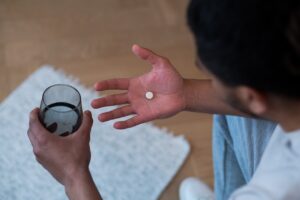
How to Treat Opioid Addiction: Understanding the Different Methods
Addicted to opioids? Struggling to find a treatment that works for you? Look no further. In this blog post, we’ll be delving into the different methods of treating opioid addiction and helping you understand which is best suited for your needs. From medication-assisted therapy to behavioral therapy, we’ve got all the information you need to take back control of your life and conquer opioid addiction once and for all.
Medication-Assisted Treatment (MAT)
 Medication-Assisted Treatment (MAT) is a comprehensive approach that combines medications with counseling and behavioral therapies to address opioid addiction. Medications commonly used in MAT include methadone, buprenorphine, and naltrexone. These medications help reduce withdrawal symptoms, cravings, and the euphoric effects of opioids, enabling individuals to focus on their recovery without the constant physical and psychological distress caused by addiction. MAT has shown substantial effectiveness in improving treatment retention, reducing illicit opioid use, decreasing overdose risk, and improving the overall quality of life. The good news is that most opiate drug addiction treatment in West Palm Beach and many other areas offer MAT in conjunction with behavioral therapy and different types of addiction treatment.
Medication-Assisted Treatment (MAT) is a comprehensive approach that combines medications with counseling and behavioral therapies to address opioid addiction. Medications commonly used in MAT include methadone, buprenorphine, and naltrexone. These medications help reduce withdrawal symptoms, cravings, and the euphoric effects of opioids, enabling individuals to focus on their recovery without the constant physical and psychological distress caused by addiction. MAT has shown substantial effectiveness in improving treatment retention, reducing illicit opioid use, decreasing overdose risk, and improving the overall quality of life. The good news is that most opiate drug addiction treatment in West Palm Beach and many other areas offer MAT in conjunction with behavioral therapy and different types of addiction treatment.
Behavioral Therapies
Behavioral therapies are crucial in treating opioid addiction, providing individuals with the necessary tools to modify their thoughts, behaviors, and attitudes toward drug use. Cognitive-Behavioral Therapy (CBT) helps individuals identify and change negative patterns of thinking and develop coping strategies to avoid relapse. Contingency Management (CM) uses positive reinforcement, such as vouchers or rewards, to motivate individuals to abstain from drug use. Motivational Interviewing (MI) assists individuals in exploring and resolving ambivalence towards treatment, enhancing their intrinsic motivation to achieve and maintain sobriety. When combined with medication, behavioral therapies have shown to be highly effective in reducing drug use and promoting long-term recovery.
Inpatient Rehabilitation
 Inpatient rehabilitation, or residential treatment, offers a structured and intensive environment for individuals seeking recovery from opioid addiction. In this setting, individuals reside in a facility dedicated to addiction treatment, receiving 24/7 support and care. Inpatient rehabilitation programs typically include individual counseling, group therapy, educational sessions, and holistic activities. The immersive nature of inpatient rehabilitation allows individuals to focus solely on their recovery, away from triggers and temptations of the outside world. These programs provide a safe and supportive environment for detoxification, therapy, and skill-building, helping individuals develop the necessary tools for lasting recovery.
Inpatient rehabilitation, or residential treatment, offers a structured and intensive environment for individuals seeking recovery from opioid addiction. In this setting, individuals reside in a facility dedicated to addiction treatment, receiving 24/7 support and care. Inpatient rehabilitation programs typically include individual counseling, group therapy, educational sessions, and holistic activities. The immersive nature of inpatient rehabilitation allows individuals to focus solely on their recovery, away from triggers and temptations of the outside world. These programs provide a safe and supportive environment for detoxification, therapy, and skill-building, helping individuals develop the necessary tools for lasting recovery.
Outpatient Treatment
Outpatient treatment programs suit individuals who do not require round-the-clock supervision or intensive care. These programs offer flexibility, allowing individuals to continue their daily routines while attending counseling sessions and therapy appointments. Outpatient treatment may involve individual counseling, group therapy, medication management, and support group participation. This approach benefits individuals with stable living situations and a strong support system. Outpatient treatment allows individuals to gradually integrate recovery skills into their everyday lives, with ongoing support and accountability.
Support Groups
Support groups, such as Narcotics Anonymous (NA) or SMART Recovery, provide a valuable network of peers who understand the challenges of opioid addiction. These groups offer a non-judgmental environment for sharing experiences, gaining …